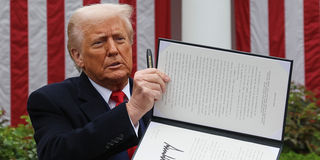Trump’s tariffs, trade wars will hurt Africa

US President Donald Trump holds a signed executive order on tariffs, in the Rose Garden at the White House in Washington, DC, US, April 2, 2025.
What you need to know:
- Protectionist policies often backfire, as global economic interdependence means isolationist strategies harm multiple economies, not just the intended targets.
- Instead of escalating trade wars, the global community must prioritize unity and sustainable economic policies that ensure shared prosperity rather than deepening economic divides.
On Wednesday, United States President Donald Trump announced what he described as “kind” reciprocal tariffs,signalling looming economic turmoil, with global markets—including Kenya—facing significant disruptions.
Trump’s plan introduces a universal 10 per cent tariff on all imported goods, alongside additional “reciprocal” levies targeting nations he claims have taken advantage of the US.
These measures set the stage for a tit-for-tat trade war, and far-reaching economic consequences for many countries. Kenya, for instance, is among the countries hit with a 10 per cent tariff, a direct response to Kenya’s existing 10 per cent tariff on American products.
While Trump insists these policies will strengthen America’s economy, critics argue they will have far-reaching effects beyond targeted nations.
American consumers are likely to face rising prices due to global supply chain disruptions. Higher costs on thousands of everyday goods—including phones and food—could fuel inflation at a precarious time.
Trump justified these tariffs by claiming the US has been “looted, pillaged, and plundered” while continuing to import key products like laptops and phones instead of fostering domestic production.
Targeted nations, including China, the European Union, United Kingdom, Japan and India are expected to retaliate, escalating trade tensions and driving up global prices.
Since its inception in 2000, the Africa Growth Opportunity Act (Agoa) has been central to US-Africa trade relations, providing duty-free access for thousands of African products.
However, Trump's protectionist policies threaten to strip African nations—like Kenya—of their competitive advantage in the US market.
The fallout could be severe: reduced trade opportunities, job losses and economic instability. If Agoa nations are subjected to these tariffs, Kenya and other African countries will struggle to compete in the US market.
American companies operating in Africa may also relocate back to the US to avoid tariffs, further damaging local economies.
For Kenya, whose textile and apparel industry heavily relies on Agoa, Trump’s tariffs could render exports too expensive for US consumers.
Factory shutdowns and mass layoffs—particularly in export processing zones—would be inevitable. Other key sectors, such as horticulture, could also suffer significant losses. With Agoa set to expire in September, Trump’s move suggests renewal is unlikely.
Unlike wealthier economies, Global South nations like Kenya are particularly vulnerable to trade wars. Even those not directly targeted will feel the impact due to their reliance on exports.
Protectionist policies often backfire, as global economic interdependence means isolationist strategies harm multiple economies, not just the intended targets.
Instead of escalating trade wars, the global community must prioritize unity and sustainable economic policies that ensure shared prosperity rather than deepening economic divides.
The writer is a journalist & communication consultant.

